Contents
- 1. Playa Valdevaqueros
- 2. Playa de Los Lances North
- 3. Playa de Los Lances South
- 4. Playa de Los Lances Mid
- 5. Playa Chica de Tarifa
- 6. Playa de Bolonia
- 7. Playa Punta Paloma
- 8. Bunker Beach (Playa de Atlanterra)
- When is the best time to visit Tarifa?
- What is the best area to stay in Tarifa?
- How windy is it in Tarifa?
Author Michael Law enjoyed kiteboarding in Tarifa in October 2022, as part of a 10-week trip through southern Spain.
Tarifa has beaches, lots and lots of beaches. Most of these are long, wide, and windy, and they attract wind sport enthusiasts from around the world. Home to some of the best beaches along the Costa de la Luz and one of the best beaches in Spain, Tarifa is the place for sun, sand, surf, and fun.
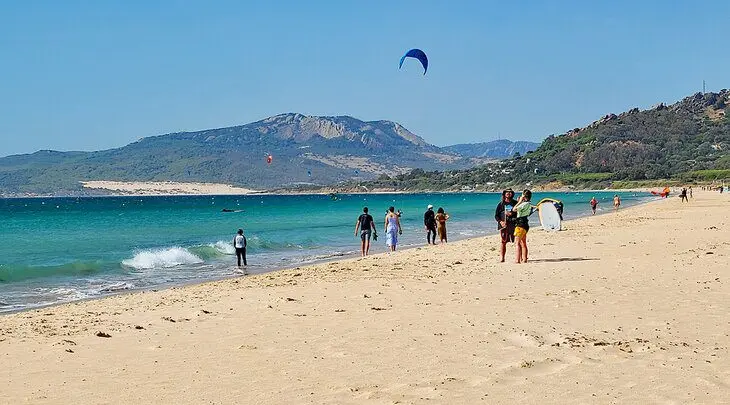
Many of the beaches are often empty or seem almost empty due to their sheer size. No side-by-side sun loungers and umbrellas are here; this is definitely not Marbella. The beaches are wild and untamed and in some places have massive dunes. If you want to wander out on the beach and get lost in your thoughts while gazing out at the Atlantic, this is the place to do it.
Find the right oceanfront spot for your trip with our list of the best beaches in Tarifa.
1. Playa Valdevaqueros
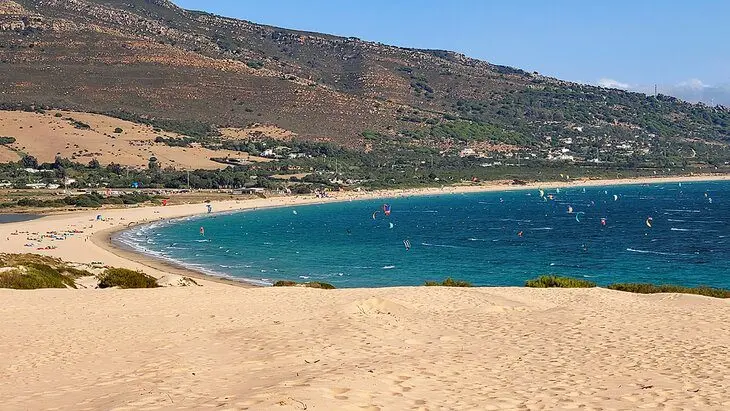
Valdevaqueros is by far and away, the most beautiful of the beaches around Tarifa. This long crescent of beach with golden sand has been drawing sun-seekers for decades. You won’t find any high-rise hotels and condo complexes here. A few funky restaurants are hidden in the trees but other than those, no services exist.
People come here for several reasons, but one of the main attractions for many people is the good conditions for wind-driven water sports. The winds here are quite consistent, allowing for kiteboarders, wingers, and windsurfers to practice their sport. The sight of hundreds of colorful kites juxtaposed against the pale blue skies and cobalt waters is astounding.

However, Valdevaqueros isn’t all about water sports, it’s also a fantastic beach for lazing about in the sun on your lounger, bestseller in hand. Alternatively, gaze out at the ocean and the kiters doing their thing and try and figure out how they manage not to get all tangled up. A specific area of the beach, at the northern end, is set aside for beachgoers only, no wind sports are allowed.
One of the top things to do at Valdevaqueros is to climb to the top of the huge dune at the end of the beach. The views from the top are truly stunning and well worth the effort. Those less inclined to do the climb can just take the road to the top instead.
2. Playa de Los Lances North
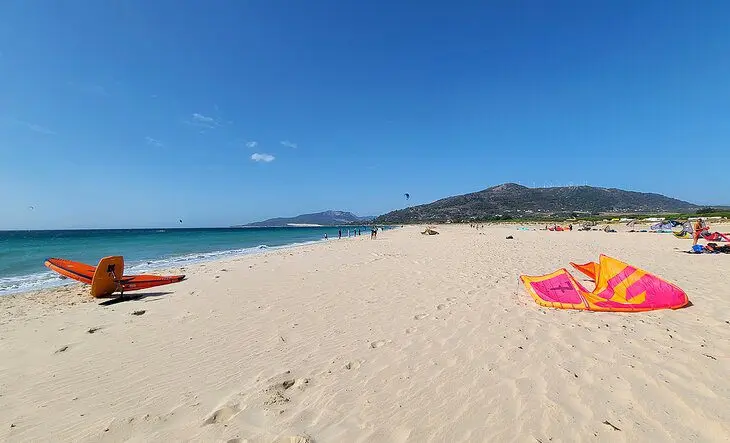
Playa de Los Lances North is second only to Valdevaqueros as a top place for wind sports. The beach is a popular spot for those looking to learn how to kiteboard, wing, or windsurf. Windsport schools with shops in town set up out here each day and teach countless newbies how to go racing across the water.
For those not interested in water sports, the beach is a wonderful spot to soak up the sun. The beach runs for miles in either direction, and the terrific crashes of beginner kiteboarders provide non-stop entertainment.
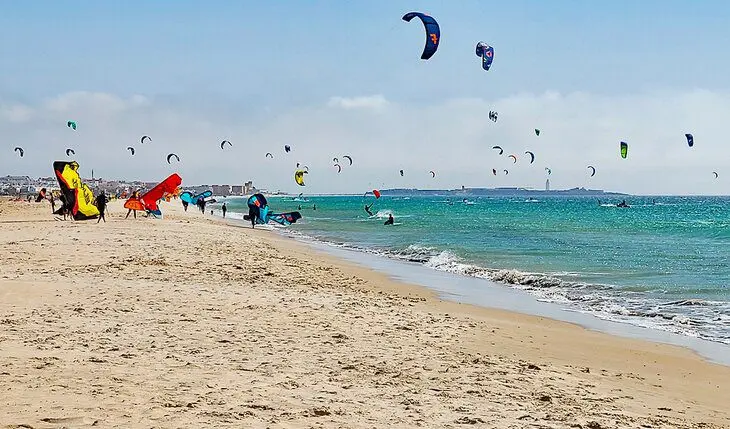
If you like camping near the beach, this is the place to do it. Two of the best campgrounds in Tarifa are located just off Playa de Los Lances North. If you’ve got the right gear or a campervan, set up here — the sites are perfect spots for a fantastically good beach vacation.
To access the beach, follow the dirt road winding its way in from the N-340 highway in a large loop. It’s here that you’ll find parking and a few beach restaurants.
3. Playa de Los Lances South
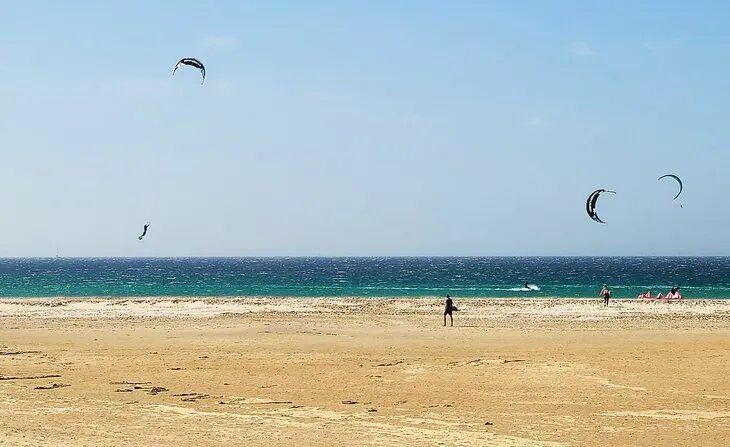
Playa de Los Lances runs for about seven kilometers from downtown Tarifa towards Valdevaqueros beach. The southern section of the beach is found right out front of downtown Tarifa, and it’s where you’ll probably end up if you are staying in the Old Town area. Playa de Los Lances South is also frequently referred to as Playa Santa Catalina.
A chiringuito (beach restaurant) is located here and if the Levante is howling, it’s an ideal place to grab a meal or drink and watch the most insane kiteboarders in the world launch themselves 20 meters (or more) into the air in complex aerial maneuvers.
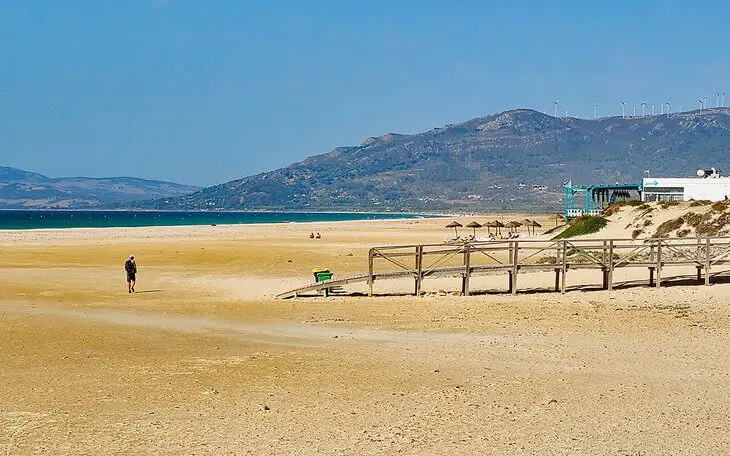
The beach is wide and generally not overly busy, a surprising fact considering the townsite is right behind it.
A wide walkway runs along the back of the beach from the southern end right through to the start of Playa de Los Lances Mid. It’s a popular spot in the morning for joggers, moms pushing strollers, and early-morning walkers. The crowd returns late in the day to catch the sun setting over the Atlantic Ocean.
4. Playa de Los Lances Mid
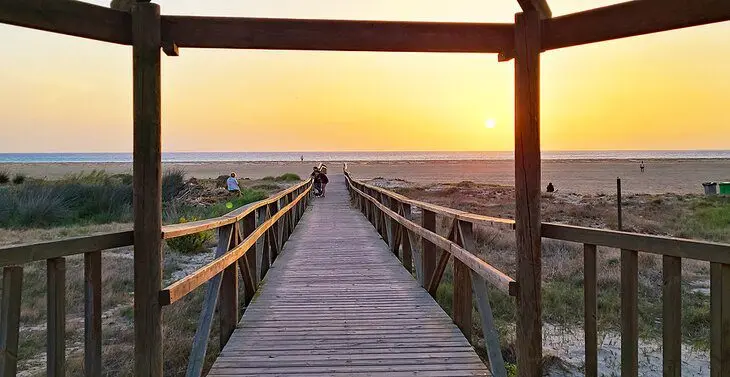
This is the area of the beach at the north end of Tarifa by the soccer stadium. It’s here that the walkway behind the beach ends and El Estrecho Natural Park starts and runs northwards. This is an area for wildlife and wide-open spaces.
Not many people visit this area of the beach, so if you truly want to be alone, this is the place to come.
Trails wind their way through the low grasses back from the beach. If you are a birder, this is a hot spot to see migrating birds. At the shoreline, an endless parade of waves washes ashore, and the views off to the horizon are spectacular. On an exceptionally clear day, you might be lucky enough to see the coast of Africa, a distance of about 20 kilometers.
5. Playa Chica de Tarifa

This is the beach to come to if the winds are up and you want to soak up a bit of sun and surf without being blasted by sand. It’s a tiny spot full of golden sand wedged in between a long breakwater and large wall. Facilities are good here, wooden walkways make getting to the water’s edge easy, and a small sun shade is available as are showers. Lifeguards are on duty in peak season.
The northern end of the beach is the most protected, and if you truly want to maximize the heat of the day, tuck in here against the white wall and let the sun rays toast you to a crisp. The views out from the beach are quite spectacular, with endless ocean out one way and, if the wind is up and from the right direction, kiteboarders launching themselves high into the air just over the breakwater.
6. Playa de Bolonia
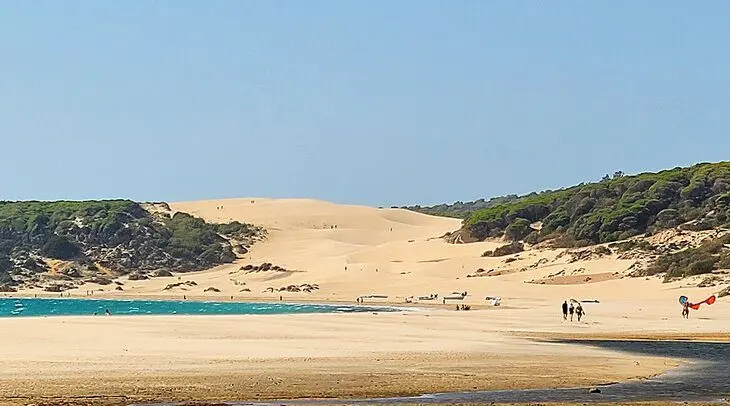
Up and over the headland from Valdevaqueros is the lonely, but truly spectacular, Playa de Bolonia. This beach is for those looking for solitude and beauty. Stretching for four kilometers, the beach is dominated by the massive sand dune at the northern end.
The dune is a Spanish Natural Monument and is about 30 meters high and around 200 meters wide. These dimensions are approximate; depending on the wind, the dune can grow or shrink in size.
The beach is a wonderful place to go for a long beach walk by yourself or with a four-legged friend. The sand is flat and hard and just perfect for setting a good pace and getting lost in your thoughts.
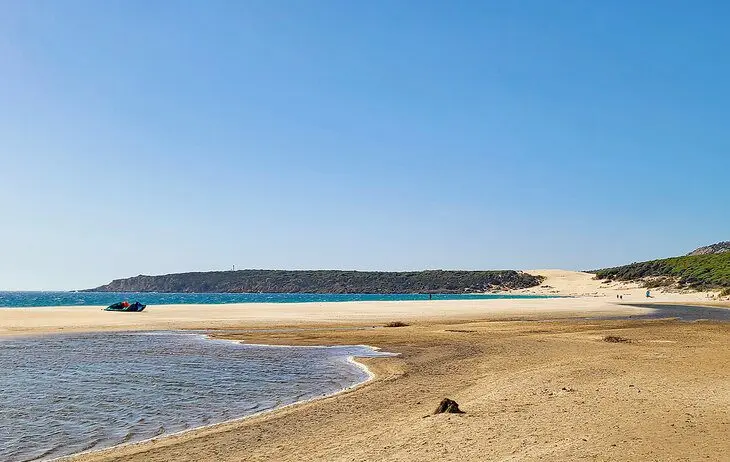
Playa de Bolonia looks much as is it did when the Romans first arrived here in the 1st century BCE to set up the once thriving Baelo Claudia. The town is long since gone, of course, but the well-preserved ruins are some of the best in Andalucía and are open to the public.
At Playa de Bolonia, it’s unlikely that you’ll go swimming unless you are a hardy northerner. The waters and large waves of the Atlantic Ocean are decidedly chilly. You may see a few kiteboarders or windsurfers out on the water, but they will definitely be wearing wetsuits.
7. Playa Punta Paloma
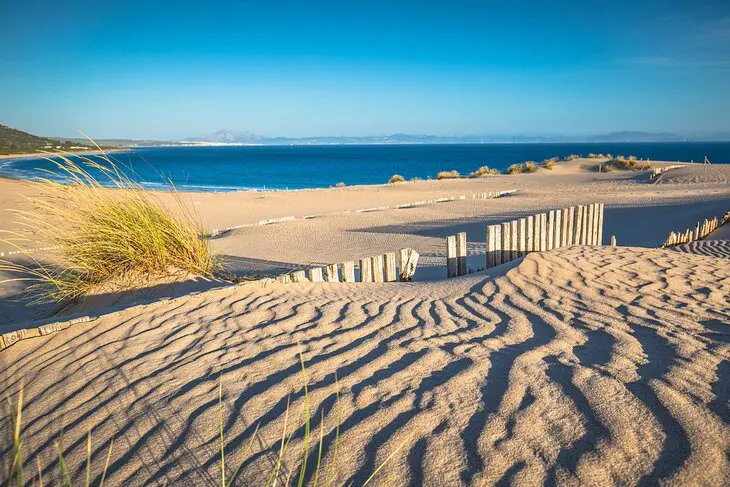
At the far end of Valdevaqueros, past the base of the huge dune and a bit to the southwest, is the wild and wonderful Playa Punta Paloma. A windy and wavy spot, this beach takes a bit of effort to get to and is usually deserted.
A mix of rocks, sand, and low coastal scrub make this an interesting place to explore. The best part of the beach is just past the rocky point where you’ll find shallow water that is somewhat protected from the wind and waves. The views out to the ocean and back to Valdevaqueros from here are quite spectacular.
To get to Playa Punta Paloma, walk to the end of Valdevaqueros and then walk past the base of the dune and keep going. You’ll know you’ve found it when you pass the point of rocks. The actual location of Playa Punta Paloma is up for debate; some people also say that Playa Punta Paloma is actually at the base of the large dune at the end of Valdevaqueros; others say it’s past the point of rocks. Wander out here and make your own decision.
8. Bunker Beach (Playa de Atlanterra)
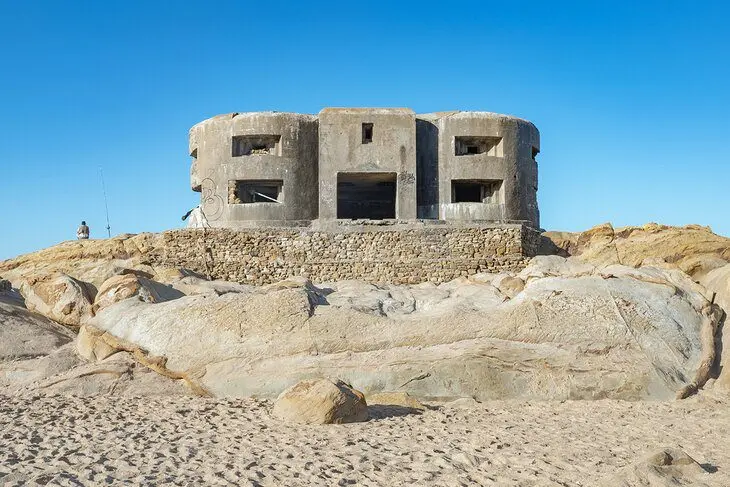
Is an easterly wind truly howling and are you looking for an escape? Consider taking the roughly 40-minute drive to Bunker Beach. Also known as Playa de Atlanterra, this beach is protected from the strong eastern winds by a large headland.
It’s on this large headland that a WWII bunker is located. It’s an interesting old relic that is worthwhile exploring if you can tear yourself away from the glorious beach located nearby. The water here is crystal clear and usually calm; a few rocks extend into the ocean, adding to the beauty of the scene.
Bunker Beach is located at the far southern end of Playa de Atlanterra and is reached either by walking down the beach or descending a set of stone stairs.
When is the best time to visit Tarifa?
| Average minimum and maximum temperatures for Tarifa, Spain in °C | |||||||||||
| J | F | M | A | M | J | J | A | S | O | N | D |
| 16 11 | 17 11 | 18 12 | 19 13 | 22 16 | 24 18 | 27 20 | 28 21 | 26 20 | 22 17 | 19 14 | 17 12 |
| PlanetWare.com | |||||||||||
| Average monthly precipitation totals for Tarifa, Spain in mm. | |||||||||||
| 122 | 107 | 107 | 66 | 38 | 10 | 0 | 3 | 25 | 76 | 150 | 132 |
| Average minimum and maximum temperatures for Tarifa, Spain in °F | |||||||||||
| J | F | M | A | M | J | J | A | S | O | N | D |
| 61 52 | 62 52 | 64 54 | 66 56 | 71 60 | 76 64 | 81 68 | 82 69 | 79 68 | 71 62 | 66 57 | 62 54 |
| PlanetWare.com | |||||||||||
| Average monthly precipitation totals for Tarifa, Spain in inches. | |||||||||||
| 4.8 | 4.2 | 4.2 | 2.6 | 1.5 | 0.4 | 0 | 0.1 | 1.0 | 3.0 | 5.9 | 5.2 |
The best timeframe to visit Tarifa is from April until mid-October. At this time, the sun is shining consistently and the air temperature is pleasant. Within that timeframe, the summer is the most popular time to visit, with late July and all of August exceptionally busy. At this time, hotels and campgrounds are usually fully booked, and the prices rise accordingly.
For those that can make it happen, September is the best month. It’s warm, the crowds have died off, and the ocean is at its warmest. That said, the ocean temperature is always pretty chilly no matter what time of year but in late summer, it’s at least somewhat bearable.
June is also another good month. It’s pre-high season and generally quite warm, but ocean temps are decidedly cool.
The winter is an option for some people, especially penny pinchers. It’s much warmer than northern Europe; however, many places close down, and the skies can be quite gray.
What is the best area to stay in Tarifa?
The answer to this question depends entirely on what you like to do. If you want to be close to the best beach, stay out near Playa Valdevaqueros. You’ll find a few hotels, and if you prefer self catering, excellent campgrounds, some with cabins and luxury Kampaoh canvas tents. If you choose this option you’ll be about 10 to 15 minutes from downtown.
For those who prefer a mix of beach and history, stay in the heart of Tarifa, preferably in the Old Town. This area of narrow, twisty streets is packed with restaurants and shops, giving it a lively vibe, especially in the evenings when the patios are packed with people laughing and having a good time.
A good spot in the middle of the action but still quiet and comfy is the Hotel Misiana . It has modern conveniences, a rooftop patio, and small pool.
If you are traveling by campervan and need a place to park, Tarifa is tolerant of the campervan lifestyle. Parking in public lots is free and allowed, except for the one closest to downtown where you’ll need to pay a nominal fee in exchange for water and gray water services.
How windy is it in Tarifa?
It’s windy most days here, so if it’s a beach vacation where you sit in a lounger under an umbrella, there may be better places to go. Places back up the coast towards Marbella have beautiful beaches and generally light winds.
Tarifa has two types of wind: the Levante, which blows from the east and is due to air squeezing through the Straight of Gibraltar. The Levante can blow for days on end and is very strong. The other wind is the Poniente, and it comes from the West. It rises around 1pm and then generally drops in the evening.
All that said, the winds can drop right off for days at a time, and at this time, lonely beaches like Bolonia are achingly beautiful.









